|
South Africa, Victoria Falls (Zambia) and Botswana
|

|
The
Other Down Under
A South African Nature and Cultural
Excursion
Frontiers Magazine, March 28, 2003
By Lawrence Ferber
|
|
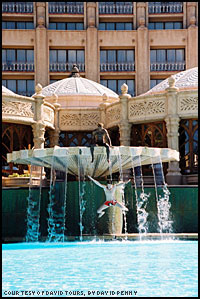
Palace
of the Lost City Resort in South
Africa
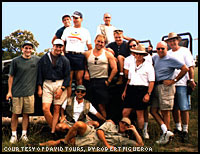
A
DavidTours [DavidTravel] group on safari in 1998
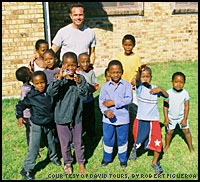
Tour
member with children in Langa
Township
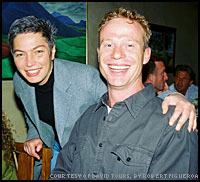
Tour
Director Christiaan with Cheryl, the
lesbian CEO of of the Cape Town Board of
Tourism
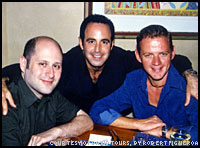
David
Rubin, center, at the Rozenhof restaurant
with author Lawrence Ferber, left, and
local friend James, who is a lawyer in
Cape Town.
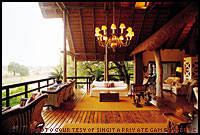
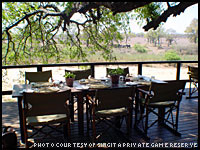
The
Ebony Lodge at Singita Private Game
Reserve
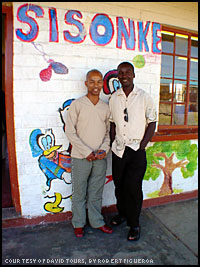
Easy
Nofemela, left, and Ntobeko Peni outside a
project run by
the Amy Biehl Foundation
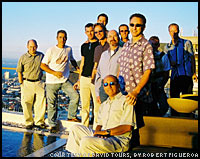
At
a party in a private home owned by a
couple who met while on one of Rubin's
tours.
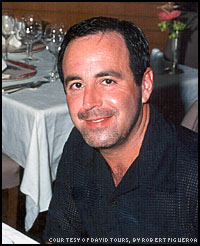
David
Rubin
|
I'm
having lunch with murderers. Two of them, in fact:
Ntobeko Peni and Easy Nofemela. The pair were among
a group of black South Africans responsible for
stoning Amy Biehl, a white American Fulbright
scholar, to death in 1993 during an angry political
demonstration-turned-homicide. The fact that Biehl
was an activist fighting for equality on behalf of
those very killers/demonstrators was a detail lost
in the fury borne by years of Apartheid's
repression and poverty.
We are
in a restaurant in the Langa Township, sharing
chicken and samp, a local starchy side dish. Peni
and Nofemela are now reformed, pardoned at the
Truth and Reconciliation Tribunals, and, in fact,
working for Biehl's activist mother, Linda, who set
up a foundation in her late daughter's name
(The Amy
Biehl Foundation). Sitting at a table with them,
David Rubin converses with great interest,
inquiring about Peni's experiences in prison.
Compact in frame, with a warm smile and manner,
Rubin is founder and head of DavidTours [DavidTravel], a gay luxury tour company.
He's brought a group of gay journalists--myself
included--on a two-week journey to South Africa and
Zambia. Our lunch is part of that journey. This is
an atypical trip for Rubin, however. Rather than
just immerse us in a typical DavidTours [DavidTravel] itinerary,
Rubin's decided to have our troupe preview new
properties, attractions and experiences.
Lunch
is receiving mixed reactions. A couple of the
journalists are unnerved, convinced the former
killers are homophobic, joking and ribbing about us
in their native tongue. But more on that later.
Summer
2001. I first met Rubin in Munich, Germany, at a
convention for gay travel professionals. Between
his easy, personable manner and the pamphlets
depicting resplendent five-star properties--in
India, South Africa, Europe and Montreal, among
other locales--I was immediately intrigued by him
and his company.
In the
summer of 2002, Rubin invited me to join his
October press-only South Africa journey. After
pondering for three minutes, I said yes. Still, I
had but a faint concept of the life-changing,
bonding experience I was in for--and certainly not
at the mountain-high level of style and luxury
Rubin's company provides.
A
group of two women and five men, we waited in the
JFK Airport departure lounge in New York, from
which South African Airways makes
its nonstop trips to Johannesburg. Rubin barely
made it to the gate in time, having rushed from a
niece's bat mitzvah (ain't he devoted!). The
flight's cramped--our business-class upgrades
didn't pan out, and the SAA coach-class concept of
legroom is rather--no pun intended--narrow.
Happily, the flight went by fast as I whiled the
hours away watching movies on my personal TV
monitor.
At the
Johannesburg airport, we're greeted and joined by a
freckly, tall strawberry blond, Christiaan.
Christiaan is an Afrikaner (or Boer), the white,
Dutch-descended South Africans. They speak
Afrikaans, a unique language blending Dutch and
German elements. South Africa also boasts a
significant white English-blooded population (it
was colonized in the 17th century by the English
and Dutch). Christiaan, who's gay, was our tour's
tour director. Rubin considers his tour directors
and his ground operators very important elements of
DavidTours' [DavidTravel's] success. Rubin doesn't accompany most
of his company's tours, and with these seasoned
experts present from arrival to departure, he
doesn't need to. Not all the tour directors and
ground operators are gay, but all are
gay-friendly.
Our
first evening was spent at the
Palace of the Lost
City, an over-the-top
resort property at Sun City. It's kitschy but
comfortable; boxes containing wine, candy, dried
fruit and sculptures were brought to my room. Sun
City is wholly artificial--an extensively
landscaped gambling and entertainment complex for
the privileged--so I couldn't wait to move on to
"real" South Africa in a couple of days. To get an
immediate taste of the wild, most of the group went
on a short game drive outside Sun City, and I'm
glad I skipped it: Their highlight was witnessing a
bird pluck the eye from a dead zebra. The serious
game sightings would wait until we left for the
bush.
Rubin
was raised in the suburban jungle of Oceanside,
N.Y. He practiced maritime then business law for
many years, until finding the latter a
soul-crushing venture that essentially involved
representing the rich in dispute cases and making
the poor cry uncle. Sickened, and aspiring to
enrich people's lives rather than devastate them,
Rubin looked to his first love for a new career
direction: travel.
After
five years of saving up, he launched his own
company, DavidTours [DavidTravel]. The first official
DavidTours [DavidTravel]
trip was to New Orleans for Halloween in 1996. "I
picked something I really knew, a city where I have
a lot of friends," he recalled, "and I did that
while I was still practicing law--to begin testing
the market, the viability of creating a company and
leaving a lucrative law practice."
He did
eventually ditch the law practice, and DavidTours
[DavidTravel]
proved viable. (They've expanded to offering luxury
cruises, wholly individualized itineraries, and
even hotel booking for all budgets.)
Our
third day in South Africa, we left Sun City's
fabricated--albeit resplendent--enclave and headed
to Makweti, our first game lodge.
At Makweti, we drove around in open-air Jeeps and
spotted animals big and small. Greeted by rangers
bearing biltong (beef jerky) and refreshing
libations, Makweti proved to be amazing, beautiful
... and malaria-free. Most game lodges are located
in regions where mosquitoes carry the pesky malaria
bug ... and they love injecting you with it!
Here, no malaria mosquitoes.
As
Rubin unpacked in his gorgeous, freestanding
private cabin (complete with homemade toiletries
and outdoor deck), I asked him what his five
favorite cities in the world are. "Cape Town," he
responded without a moment's deliberation. "Paris.
New Orleans. Stockholm."
Why
Stockholm?
"I
have a weakness for blonds," he said, grinning.
"And the stunning detail, clean lines, the look,
the feel."
City
number five?
"Udaipur,
India. It's beautiful, gentle; you can comfortably
walk around, enjoy India and Indian people."
Although
we're certainly comfortable, we won't be walking
over the next hour or two. The game-drive Jeeps
were prepared, our rangers saddled up, and we
hopped in with cameras loaded.
One or
two of my group have lovers back home, but for all
intents and purposes we're a pack of singles.
Rubin, however, has seen all sorts of
relationships, blood and otherwise, represented on
his tours: singles, couples and even three-way
relationships. "The mix has gone beautifully," he
noted. "What we find is we have, first and
foremost, people with a lust for travel. It's a
passion. A lot of our clients, they love developing
friendships over a week or two-week trip that in
real life would take 10 or 15 years because
everybody has busy lives."
We
enjoyed an evening game drive, spotting numerous
rhinoceroses and a cranky elephant that debated
charging our Jeep. But no lions.
The
next morning, we woke up very early and, before
driving six hours to our next game lodge, we, in
fact, spotted a few female lions. One walked
directly in front of my vehicle, passing
nonchalantly, unperturbed by our presence.
Our
next lodges were deeper in the bush, northern
malaria country at that. On the subject of malaria,
there are several anti-malarial medications
available. The easiest to take with fewest possible
side effects and most effective bug-killing
properties is Malarone. Since malaria lies dormant
before it attacks--and thus can be
counterattacked--the medication needs to be present
in your blood before and after infection.
Therefore, we take our medications a couple of days
before entering the region, and must continue for
two weeks afterward.
Mala
Mala was the next game reserve,
and it's got a reputation for placing exciting
animal-filled drives before everything else. Which
is not to say the rooms and cuisine and comforts
were less than delectable. The drivers were quite a
hot lot, too, although terminally heterosexual.
That said, one DavidTours [DavidTravel] client managed to
literally seduce the shorts from one of these guys,
so a hot-ranger sex fantasy may not be completely
fantastical. The evening's game drive lived up to Mala Mala's reputation; we saw numerous lions,
leopards, rhinoceroses, elephants, giraffes,
impalas and wide-eyed "bush babies," cute squirrely
things with eyes so big you can see them reflecting
light from hundreds of feet away. Unfortunately,
our stay in Mala Mala commenced a nightmarish
running joke of my tour: wake-up-call hell.
At
dinner, I informed my co-travelers that I would be
abstaining from the unholy 5 a.m. game drive the
next morning, as I preferred to sleep. Without
copious amounts of sleep, I am a cranky, vile
creature. One of the group, however, thought I said
something to the tune of changing my mind about the
morning drive, and "thoughtfully" had me woken up.
I was so furious that I couldn't get back to sleep
without popping an Ambien. Know this: Lawrence
Ferber loves sleep. Travel, food, redheaded
boyfriend, sleep.
This
wake-up-call joke continued for the rest of the
trip. Any morning I was permitted to sleep in, a
wake-up call would come nonetheless. I began taking
every possible precaution, yet in futility. If I
unplugged the phone, someone came knocking at my
door. At the five-star Royal Livingstone in Zambia,
I left explicit word with the staff, placed a "Do
Not Disturb" sign on my door, and went to sleep. At
7 a.m., the phone rang. A polite voice on the other
line said: "Excuse me, sir, but there is a 'Do Not
Disturb' sign on your door. What time shall we come
back to check on your mini-bar?"
Rubin
shook his head in disbelief when I told him about
this final incident an hour or two later. "The
hotels have been terrible with the wake-up calls,
waking up people inappropriately when they've been
told not to," he lamented. "What I feel is I have
to work on devising systems to deal with that. What
I have discussed with Christiaan is we will put it
in writing, who is to be woken and when. It will be
given to management, we will keep a copy, and
basically we will say heads will roll if this isn't
followed. This is too crucial; it destroys all the
hard work that's been done to create a fantastic
hotel, and it's talking about the health and sanity
of our clients. It really is. It's a busy tour. You
need sleep. Someone may have a cold, they may be
sick, and that's a very big issue."
Discussing
the incidents further, Rubin explained that native
Zambian staff--most lived in poverty before jobs at
the Royal Livingstone rolled in--are still learning
concepts of this kind of service. The Livingstone's
parent company, Sun International, had, in fact,
trained local staff in the art of running. Yes,
running. The concept of "hurrying" was unheard of.
This isn't a racist thing; the locals just didn't
understand that when a visitor at a $600-a-night,
five-star hotel asks for a $15 martini, or a sewing
kit, or anything, you don't take your sweet time
with it. You get going! By the same cultural token,
Rubin felt the whole wake-up-call phenomenon
deserved a little slack. After all, man existed in
Zambia for some 2 million years before luxury
hotels entered the picture.
"I
remember several years ago I went to a store in
London: Simpson's of Piccadilly. I bought a vest
and brought it home and all the colors ran," Rubin
proffered. "I wrote to the company saying, 'I'd
like to send back the vest ... I'd like it to be
replaced.' And they said, 'Once something is
purchased, it's yours, we have no further
responsibility for it.' At Saks [Fifth] or
Nordstrom, in a minute that would have been
changed, no questions asked. But it's different
cultures and mentalities, so we have to do our best
to find the right partners. We really say to the
clients, 'Please try to leave the U.S.A. behind.
Please realize the pace of the country, that
English isn't often the first language. Please
don't go to a restaurant and expect to be served in
half an hour.'"
Still,
Rubin goes to significant lengths previewing
properties himself to ensure comforts are maximum
and problems nonexistent. Long-term relationships
with these properties and management companies are
priority, and as a result DavidTours [DavidTravel] receives the
best premium treatment. If there are any doubts to
that end, you won't be going there. To wit: While
we were at Mala Mala, Rubin visited and stayed at
another high-profile lodge that was courting his
business. It didn't pass muster.
"Tremendous
disappointment," he groused later. "It's one of the
top-rated lodges; it's almost always sold out. And
from A to Z everything went wrong--the written
communications saying everything would be covered,
my transfers would be complimentary. Then I was
told, 'No, sorry, here's the bill. If spending a
couple of hundred dollars on a transfer is such a
big issue, then you're not making enough money.'
'The issue is not the money,' I said. 'The issue
is, Can I send a client there with confidence that
what's been agreed to in writing will be followed?'
Then, getting there at about five o'clock in the
evening I was told, 'You missed your game drive.
We'll wake you up in the morning and you'll enjoy a
nice dinner tonight.'
"If I
was a consumer unfamiliar with the routine of a
luxury lodge I would have been very disappointed
and just gone to dinner," he continued. "Instead, I
said to them, 'Hey, guys, I know you have support
vehicles. Why don't you find out where my ranger is
and take me in a support vehicle to the Jeep so I
can go on game drive?' The response was 'Sure, we
can do that.' That should have been automatically
offered when you're paying $650 per person per
night. Then I'm on a game drive and the ranger is
one of the worst I have ever had. He didn't bring
the bush alive. He said nothing. There was a couple
on the Jeep and they'd never been on a game drive
and they learned absolutely nothing."
Barring
wake-up-call issues, there were no complaints to be
lodged against any of the properties we visited.
That especially goes for
Singita, our itinerary's final game
reserve. This was a sensory paradise. Each private
cabin featured several temperature-control units, a
deck overlooking all sorts of wildlife at play, a
pool, an outdoor and indoor shower, a living room,
full and complimentary mini-bar, king-size bed,
bathtub--the list of luxuries goes on. This was
total honeymoonland, and many gays go to Singita
for romance. If I hadn't already been convinced
that DavidTours [DavidTravel] was one-of-a-kind and
discriminating in taste, this nailed it. The food
was also exemplary: One evening's dinner was served
in the literal bush, with lanterns hanging from
trees and armed rangers ensuring curious lions
didn't join us.
Being
close to these animals (including the "big
five"--lions, zebras, elephants, leopards and
buffalo), you become acutely aware that a way of
life exists here that knows nothing of banking,
public transportation, brand names, et cetera. It's
awesome. Everything's real in ways even 9/11
couldn't impart. Granted, you're not exactly a
pauper if you can afford to take one of these
drives (although journalists, even worldly,
traveling ones, often straddle that line!), but so
much becomes trivial.
Cape
Town, which is reminiscent of San Francisco, was
next on the trip's agenda, and there's plenty of
fun nightlife, but also lots of less-trivial
reality, if you explore. The decrepit townships,
created for the blacks during Apartheid, surround
much of the city. I'll briefly--and to the best of
my abilities--explain Apartheid: In the 1940s, the
Afrikaners conceived of Apartheid as a means of
holding power and enforcing racial segregation. In
1948, Apartheid laws were enacted,
institutionalizing racial discrimination under a
whites-only government. Whites and blacks were not
allowed to marry, black labor was exploited and
blacks were stripped of their land, relegated to
living in hideously decrepit townships. It took
until 1994, when Nelson Mandela (an activist jailed
for 27 years) was elected president, for Apartheid
to finally, officially end. But the townships
remain, and the violence sprung from oppression
lingers; blacks have a long way to go before
reclaiming something even resembling equality in
education, the workforce, economics and society
overall. There's much to be done.
I'm a
jaded New York City boy, but I admit to feeling a
little unnerved while exploring parts of Cape Town.
Apartheid, although gone, has left a ghostly cloud
of poverty and tension.
It's
not recommended to travel from neighborhood to
neighborhood by any other means than a private
taxi--and one you phone up at that. Hailing a taxi
on the street can be dangerous, as some clever
thieves have taken to pilfering taxis and hijacking
passengers. Communal mini-bus "taxis," these
usually rusty, and cramped vans driven by reckless
lunatics (crashes are frequent) are a popular mode
of public transportation. Trains--frequented by
pickpockets and robbers looking for a dumb,
money-rich tourist--are another option. Pay extra,
take the private taxis, insisted Rubin and his many
local friends. So long as the exchange rate remains
in our favor, I strongly advocate this as
well.
The
first night, we took in Cape Town's bustling gay
village, which our lodging--
Harbour View Cottages --was conveniently located within. I
went back and forth between
Bronx bar, a crowded disco, and 55 Bar/Club
each evening.
Come
nighttime, paid armed guards patrol this vicinity,
and so do a number of unemployed blacks, who act as
unofficial watchmen. These fellows expect tips, and
wherever they can find them. If you make eye
contact or speak with these guys, you risk being
pressured for a tip, so remain cordial but distant.
Don't make pals. One of our party, drunk, knocked
on my door one night, a grinning guard all but
attached to his arm.
"Do
you have $20?" my friend asked.
"Uh,
no, sorry."
They
headed to another door. Canvassing of a whole new
stripe.
On two
evenings, we were surrounded by Rubin's
friends--good-looking, affluent, gay. And white.
Rubin, in fact, has black South African friends,
but they were unable to join us due to lack of
transportation. At Rozenhof, a gay-owned
whorehouse-turned-restaurant, the Cape Town tourism
representative--a lesbian--was with us. Another
evening, we were the guests of honor at a party
thrown by a very privileged couple, Thomas and
Anton, in their indescribably upscale mountainside
house overlooking the ocean. Why us? It was on a
DavidTours [DavidTravel] vacation that they met.
"Thomas
was a client," Rubin recalled with great fondness.
"He went on my Christmas / New Year's tour in 1997 or
1998. He ended up signing up at the last minute; he
was a single fellow traveling on his own. We had a
dinner in Johannesburg, and I had about 20 friends
and friends of friends, and quite magically it
ended up that Thomas and Anton were sitting
together. They both share an incredible passion for
modern art, and the conversation was absolutely
nonstop. My friend was sitting next to them and it
just progressed to 'Come to my home so I can show
you my art collection.' And the rest is history. To
me, that's some of the most rewarding things and
brings me amazing joy. Each time I see them they
put their arms around me and give me a big hug.
Thomas says, 'I never would have dreamed this. I
gave up on finding that love of my life and I went
on your tour and found him.' "
One
day was devoted to confronting the images we see on
the U.S. news and read about in the
papers--townships and the AIDS crisis. First, we
visited the Nazareth House, an orphanage for
children whose parents have succumbed to AIDS. All
but one or two of the children are HIV-positive
themselves, and all are black. The Nazareth House
is run by white Catholic nuns. I was a little
apprehensive about that detail. Don't get me wrong.
I'm highly appreciative of their kindness, humanity
and generosity (and Sir Elton John's, whose
foundation funds Nazareth significantly), but
cringe about the fact they jam a glowing
white Jesus--and organized religion
overall--down these unfortunate black children's
throats.
Gathered
in the conference room to view a video about the
house--portions are hard to watch, depicting
children with all sorts of AIDS-related physical
ravages--we had some time to talk with a pair of
the sisters. The children receive no
anti-retroviral medications. There's no funding for
it, on a governmental level or otherwise. (The only
sector of the population that does receive such
government-provided medication is pregnant women,
so their children might be born HIV-negative.) I
asked whether the children are told about
homosexuality, and how that's handled. They're not,
the sisters responded with a notable dash of
discomfort. One of the kids has a cross-dressing
"problem," they added, and they're trying to reign
him back in to "normalcy." I quietly bristled.
Incidentally, South Africa's version of "Sesame
Street" currently features an HIV-positive
Muppet.
When
we entered the Langa Township later that same day,
the residents, especially the children, were
welcoming, excited to see visitors. We entered some
of their homes; some of these shacks are sweltering
and decrepit, not befitting human life, but there's
renovation at hand. Modern living units, sort of
townhouses, are rapidly replacing them. And
individual homes, just like you'd see in any
suburb. Some township residents are becoming
entrepreneurs, opening bed & breakfasts and
restaurants. Not Olive Garden franchises, mind you.
But I wouldn't put it past Starbucks to plant posts
here a few years down the line if improvements
continue.
At one
of these restaurants, Lelapha (49 Harlem Ave.,
Langa, 27 21 694-2681), which I can't recommend
strongly enough for its succulent, hearty African
home cooking, we joined Biehl and the murderers.
(The Biehl case and her murderers' pardoning, is
documented in the film "Long Night's Journey Into
Day".)
Some
of the journalists were ruffled and uneasy about
the erstwhile killers' presence, and kept their
distance, blanching. Later, they voiced an opinion
that Peni and Nofemela were making fun of us for
being gay. I don't know if I buy their impression.
Nofemela and Peni were speaking a language we
didn't understand, and these guys have come into
contact with numerous gays as part of the Biehl
Foundation's work. To me, they seemed friendly and
jovial.
Although
Rubin was saddened that members of our party wished
they were elsewhere during lunch, he was also
disappointed that they didn't take the opportunity
to confront the two men. "I think part of what we
are here for is to be ambassadors," he said with a
shrug. "These people were working for a
human-rights group, to improve people's lives. ...
I would have loved, just on a personal level, to
connect with and confront them if [members of
our party] thought they were being anti-gay. I
think it would have been important for the basic
core of what that organization is. If it had been
confronted, I think that would have been great, and
food for some great stories. I would like to see a
gay press where journalists are digging their teeth
in and grasping this opportunity to speak with
these people. It's a secure environment--their boss
is sitting there, there's no danger. Confront
someone."
We
spent a couple of evenings at the Table Bay Hotel,
which is safely nestled in a high-end tourist area
(and just eight minutes by taxi to the gay
village), and which has tons of shops open until 9
p.m., and restaurants. My favorite meals in Cape
Town, aside from the township restaurants, were had
at the Table Bay's Atlantic Grill restaurant (rated
the No. 1 restaurant in South Africa by
Condé Nast Traveler) and the
Rozenhof. In Cape Town, I also opted to confront
great white sharks on a day expedition, on which
you go to a shark-infested bay, chum for sharks,
get into a cage à la "Jaws" and freak out.
Johannesburg
was our final stop, and it was a little too brief.
I would have loved a few more days to just bum
around the Rosebank neighborhood's indoor/outdoor
shopping center, eating fresh pizzas for about $3 a
pop and people watching. Driving around town, we
stopped at a flea-market area where medicinal herbs
and other magical--literally, apparently--items are
peddled. One of our group bought some crocodile
fat, which allegedly possesses healing properties.
The jar it's dispensed from, into a worn plastic
sandwich bag, was as sanitary as, say, a filled
week-old biohazard disposal unit, and it made us
gag. The lucky purchaser decided to go
unhealed.
We had
dinner with Rubin's local friends at a great,
gay-friendly restaurant, Lust, in the very queer
Melville neighborhood. Over flavorful,
flame-broiled game meats, including ostrich and
kudu we discussed issues of racism. Many of the
whites are of an opinion that racism is all gone,
or no more prevalent than in American big cities. A
black lesbian insisted that many blacks are refused
entry into the city's gay nightlife complex,
Heartland, and racism is still a serious issue.
At
some point, a white male member of the dinner party
tried to argue that denial of South African
nationality to blacks during Apartheid was
justified because they were, in a sense, squatters,
having come from the rest of Africa, drawn by the
great things the Europeans had created in South
Africa.
I
think that was the "logic" behind this person's
argument. I'd actually forgotten--no,
repressed--this incident until writing this
article, while mining my memories for more
anecdotes and details.
To be
fair, there wasn't much clashing of ideologies
(racist or otherwise) or personalities during our
journey. Over the two-week period of the trip, our
group grew into a family. Each of us had a strong
character, however, and it wasn't always easy. One
of my new "brothers" is a cherubic, strongly
opinionated publisher. "When I saw you at the
airport I thought, 'Oh, no, a nerd,'" he revealed
during our final hours in our hotel, the Grace
(www.grace.co.za), over cake. "But then I
discovered that you can be the biggest bitch! I
love you, honey!"
The
chemistry for our trip had been an act of inspired
serendipity. It turns out some of us simply fell
into place. Still, there is an element of
cultivation to Rubin's organized tours, and
sometimes he must become super-attentive to these
issues.
Do you
ever say this person might clash with another
person, so I might want to dissuade them, David? I
asked. "It's a lot of feeling around and trying to
find the right point to diplomatically steer
someone in a different direction," he said. "We've
even told people that we're not the right match.
See, I don't discriminate against anyone. Anyone is
welcome on our tours with the understanding we
specifically market to the gay community. I use the
term 'gay community and friends' very expansively.
I have had men who call and ask, 'Will it be an
all-men's tour?' I respond there's a certain
probability it will be, but 15 of my tour directors
are women and there could be women on the tour. So
if you need an all-male environment, we're not the
right match for you."
Months
later, I know DavidTours [DavidTravel] was the right match for
me. There's a tall, wooden giraffe staring at me as
I type. I bought it (well, haggled it down) for
around $10 at the African Craft Market, which was
just a few steps from our Johannesburg hotel. I'm
seeing almost all of my new DavidTours [DavidTravel] friends
socially whenever possible. And I realize I could
easily write another 50,000 words--longer,
even--about my experiences in South Africa with
them. I intend to go back, DavidTours [DavidTravel] or not. I
miss the animals. I miss the
where-mountains-meet-water beauty of Cape Town, and
the genuine friendliness of the South African
people, black and white.
|